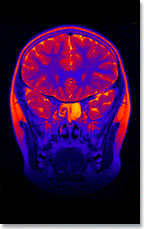 New research by a group of experts from Yale has found that depression and anxiety can result in shrinking of brain tissue, a process that may be triggered by expression of a solitary gene.
New research by a group of experts from Yale has found that depression and anxiety can result in shrinking of brain tissue, a process that may be triggered by expression of a solitary gene.
Significant depression or chronic anxiety can create the loss of brain volume, a condition that contributes to both emotional and cognitive problems. In research released the other day in the journal Nature Medicine, specialists claimed a single genetic switch induces loss of brain volume in people with depression and anxiety.
The hereditary switch known as a “transcription factor” represses the expression of numerous genes that are required for the forming of synaptic connections between brain cells, which in turn can contribute to loss of brain mass in the prefrontal cortex.
Expression of a solitary gene dramatically reduces synaptic hookups between mind cells. Yale analysts think this may explain why people dealing with persistent anxiety and depression suffer loss of brain volume.
The researchers goal was to test the idea that stress creates a loss of brain synapses. There results found that circuits usually involved in feeling, as well as cognition, are interfered with when the solitary transcription factor is activated.
The research group, funded by the National Institutes of Wellness and the Connecticut Department of Mental Health and Addiction Services, evaluated tissue of depressed and non-depressed clients. The brains of patients who had actually been depressed displayed reduced degrees of expression in genes that are required for the function and framework of brain synapses. The researchers hope that their work may help in the development of more effective antidepressant therapies.